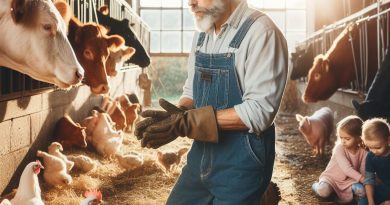Summer Health Tips for Small Ruminants
Last Updated on March 2, 2024
Introduction
Brief explanation of small ruminants
Small ruminants, including sheep and goats, play a vital role in the agricultural industry.
These animals are valued for their milk, meat, and fiber production, making them valuable assets for farmers and communities.
However, their health needs to be carefully managed, especially during the hot summer months.
Importance of maintaining their health during summer months
During summer, small ruminants are subjected to various challenges that can affect their well-being.
High temperatures, increased humidity, and possible water scarcity can result in heat stress, dehydration, and reduced feed intake.
Additionally, parasites and diseases tend to thrive in warm environments, posing a threat to the animals.
Purpose of the blog post
The purpose of this blog post is to provide practical tips and guidelines for farmers and livestock owners to ensure the optimal health of their small ruminants during summer.
By implementing proper management strategies, such as providing shaded areas, ensuring access to clean water, and regular health checks, the risk of heat stress, dehydration, and diseases can be minimized.
It is important to understand that small ruminants have specific health requirements during summer, and neglecting these can lead to significant economic losses for farmers.
Therefore, by following the advice outlined in this blog post, farmers can ensure the well-being and productivity of their small ruminants even during the hottest months of the year.
Provide Adequate Shade and Shelter
Adequate shade is essential for the health and well-being of small ruminants during the hot summer months.
Here are a few reasons why providing shade is important:
Importance of shade for small ruminants
- Protects animals from direct sunlight and heat
- Prevents sunburns and reduces the risk of heat stress
- Allows animals to regulate their body temperature and stay cool
- Reduces the risk of dehydration and related health issues
Tips for creating shaded areas
By following these tips, you can ensure your small ruminants have adequate shade during the summer:
Use trees or structures
Planting trees strategically in your pasture can provide natural shade for your animals.
Make sure the trees are large enough to provide ample coverage and plant them in areas where they will provide the most shade during the hottest parts of the day.
Utilize shade cloths or tarps
If you don’t have existing trees or structures, you can create portable shade areas with shade cloths or tarps.
These can be easily attached to poles or fences to create temporary shade shelters.
Make sure to secure the cloths or tarps tightly so that they don’t get blown away by strong winds.
Remember, when creating shaded areas, it’s important to consider the size of your herd and the amount of space needed.
Ensure that there is enough shade to accommodate all your animals comfortably.
Providing shade and shelter for small ruminants is crucial for their overall health and welfare during the summer.
Lack of shade can lead to heat stress, dehydration, and other heat-related illnesses.
By prioritizing shade, you can ensure your animals stay cool and comfortable.
Additionally, it’s important to monitor your small ruminants regularly during hot weather and look out for signs of heat stress.
These signs may include excessive panting, drooling, weight loss, reduced appetite, and lethargy.
If you notice any of these symptoms, take immediate action by providing additional shade, offering fresh water, and seeking veterinary care if necessary.
Essentially, providing adequate shade and shelter is essential for the summer health of small ruminants.
Whether through natural tree cover or man-made structures, ensuring that your animals have access to shade will help prevent heat-related illnesses and ensure their well-being.
Read: Wool vs. Hair Sheep: What’s Best?
Ensure Access to Clean Water
Significance of water for small ruminants in summer
Water is essential for the health and well-being of small ruminants, especially during the hot summer months.
It helps regulate body temperature, aids in digestion, and keeps animals hydrated.
Tips for maintaining clean and accessible water sources
- Install automatic waterers for convenience and to ensure a constant supply of fresh water.
- Regularly clean and refill water troughs to prevent the buildup of bacteria, algae, and other contaminants.
Access to clean water is crucial for the overall health and productivity of small ruminants, especially during the summer months when dehydration risks are higher.
Ensuring that your animals have access to clean and fresh water is essential for their well-being.
Water plays a vital role in the proper functioning of a small ruminant’s body.
It serves as a cooling mechanism, helping them regulate their body temperature, preventing heat stress, and maintaining optimal health.
Additionally, water is essential for digestion as it helps break down food and aids in nutrient absorption.
To maintain clean and accessible water sources for your small ruminants, consider the following tips:
Install automatic waterers
These devices provide a continuous supply of fresh water and eliminate the need for manual refilling.
They are convenient and ensure that your animals always have access to clean water.
Regularly clean and refill water troughs
Clean water troughs are essential to prevent the buildup of bacteria, algae, and other contaminants.
Empty and clean the troughs at least once a week, removing any debris or residue.
Refill them with fresh, clean water to ensure your animals stay hydrated.
By implementing these practices, you can ensure that your small ruminants have access to clean and safe drinking water throughout the summer.
Providing clean water not only promotes their overall health but also improves their immune system, digestion, and productivity.
Read: Shearing Techniques for Sheep: A Guide
Address Potential Parasite Issues
Common parasites affecting small ruminants in summer
Small ruminants, such as sheep and goats, are susceptible to various parasites during the summer months.
These parasites can cause significant health issues and reduce the overall productivity of the animals.
Gastrointestinal worms
One of the most common parasites affecting small ruminants in summer is gastrointestinal worms, including roundworms, tapeworms, and stomach worms.
These worms can affect the digestive system and cause weight loss, diarrhea, and anemia.
External parasites
Small ruminants are also prone to external parasites, including ticks, lice, fleas, and mites.
These parasites can cause skin issues, itching, irritation, and even transmit certain diseases.
Tips for parasite prevention and control
To ensure the health and well-being of small ruminants during the summer, it is crucial to implement effective parasite prevention and control measures.
Here are some helpful tips:
Regular deworming schedule
Developing a regular deworming schedule is essential to keep the parasite load under control.
Consult with a veterinarian to determine the appropriate deworming treatments and intervals based on the specific parasites prevalent in your area.
Proper pasture rotation
Implementing a sound pasture rotation strategy is crucial for parasite control.
Parasites thrive in contaminated pastures, and rotating the animals to fresh, clean pastures can help break the parasite lifecycle.
This practice reduces the risk of re-infestation and improves overall herd health.
Maintaining a clean environment
Maintaining a clean and sanitary environment is crucial for preventing parasite infestations.
Regularly clean and disinfect housing, feeding areas, and water sources to minimize the risk of parasite transmission.
Provide proper nutrition
Ensuring small ruminants receive proper nutrition is essential to strengthen their immune system and make them more resistant to parasites.
Provide a balanced diet rich in essential nutrients, vitamins, and minerals. Consult with a nutritionist or veterinarian to formulate a diet suitable for your animals’ specific needs.
Practice selective breeding
Selective breeding can play a significant role in reducing the susceptibility to parasites in small ruminants.
Breed animals that have demonstrated resistance to parasites, as this trait can be passed on to future generations.
Monitor and assess for signs of infestation
Regularly monitor small ruminants for signs of parasite infestation.
Look out for symptoms such as weight loss, poor body condition, diarrhea, anemia, rough hair coat, and excessive scratching.
Early detection allows for prompt treatment and prevents further spread.
Consult with a veterinarian
It is essential to consult with a veterinarian to develop a comprehensive parasite prevention and control plan tailored to your specific herd.
They can perform fecal examinations, suggest appropriate dewormers, and guide you on best practices.
Ultimately, addressing potential parasite issues is vital for the overall health and productivity of small ruminants during the summer months.
Implementing a regular deworming schedule, practicing proper pasture rotation, and maintaining a clean environment are essential steps in preventing and controlling parasites.
Providing proper nutrition, practicing selective breeding, monitoring for signs of infestation, and consulting with a veterinarian complete a comprehensive parasite prevention plan.
By taking these proactive measures, small ruminant owners can ensure the well-being and success of their animals.
Manage Heat Stress
Impact of heat stress on small ruminants
Small ruminants, such as sheep and goats, are highly susceptible to heat stress during the hot summer months.
The rising temperature can cause various health problems and even lead to death if not managed properly.
Heat stress affects their overall productivity, reproductive capacity, and immune system.
It is crucial for farmers to understand the consequences of heat stress on their small ruminants and take necessary measures to alleviate it.
Ways to alleviate heat stress
Provide access to fresh, clean water
Water is essential for regulating body temperature and overall hydration.
During hot weather, small ruminants require increased water intake to stay cool and maintain normal bodily functions.
Farmers should ensure that there is a constant supply of fresh, clean water easily accessible to their animals.
Maintain good air circulation
Adequate ventilation is crucial in preventing heat stress.
Farmers should ensure that the barns or shelters where small ruminants are housed have proper airflow.
Good ventilation helps in dissipating heat and keeping the animals cool.
Providing shade in the grazing areas can also help reduce the impact of direct sunlight and heat.
Consider shearing or trimming excessive hair
Sheep and goats have a natural coat that protects them from cold weather.
However, during summer, the thick coat can become a burden, trapping heat and causing discomfort.
Farmers can consider shearing or trimming the excessive hair to help small ruminants cope with the heat.
This practice allows better air circulation and prevents heat buildup.
By implementing these strategies, farmers can effectively manage heat stress in their small ruminants and ensure their well-being throughout the summer months.
Read: Sustainable Livestock Feed Ideas
Balanced Nutrition and Feeding Practices
Importance of Proper Nutrition During Summer
Proper nutrition is crucial for the overall health and well-being of small ruminants, especially during the summer months.
By following these tips, you can ensure that your animals receive the balanced nutrition they need.
Tips for Maintaining Balanced Nutrition
To ensure optimal nutrition for your small ruminants during the summer, consider the following practices:
Use High-Quality Forage
Including high-quality forage in their diet is one of the most important aspects of maintaining proper nutrition for small ruminants during the summer.
Fresh grass is an excellent source of nutrients, especially if it is young and leafy.
Additionally, legumes such as clover and alfalfa can provide valuable protein and energy.
Well-preserved hay can also be fed to small ruminants during the summer.
It should be free from mold and dust, as these can have harmful effects on the animals’ respiratory system.
High-quality hay can provide essential nutrients and fiber that support proper digestion and overall health.
Supplement with Appropriate Minerals and Vitamins
In addition to forage, supplementing with appropriate minerals and vitamins is essential for small ruminants.
These nutrients play vital roles in metabolism, bone development, immune function, and reproduction.
Consulting with a veterinarian
Consulting with a veterinarian or a livestock nutritionist can help determine the specific mineral and vitamin requirements of your small ruminants.
They can recommend commercially available mineral and vitamin supplements formulated for sheep and goats.
Regularly assess your small ruminants’ body condition
Regularly assess your small ruminants’ body condition and adjust their diet accordingly.
This will ensure that they receive balanced nutrition suitable for their specific needs.
Proper nutrition also helps prevent health issues such as metabolic disorders and reproductive problems.
Generally, providing proper nutrition to small ruminants during the summer is vital for their overall health and productivity.
Using high-quality forage and supplementing with appropriate minerals and vitamins are essential practices to maintain balanced nutrition.
By following these tips, you can support the well-being of your small ruminants and promote their optimal growth and performance during the summer months.
Read: Ethical Livestock Breeding Tips

You Might Also Like: Effective Fencing for Pasture Rotation
Monitor and Prevent Disease Outbreaks
Common diseases affecting small ruminants in summer
In the summer, small ruminants are susceptible to various diseases that can affect their health and productivity. Here are some common diseases to watch out for:
- Pneumonia
- Foot rot
- Parasitic infections
- Flystrike
These diseases can cause severe illness and even death if not properly managed.
Tips for disease prevention
To ensure the well-being of your small ruminants during the summer, it is crucial to take preventive measures against diseases.
Here are some tips:
Practice biosecurity measures
Implementing strict biosecurity measures can significantly reduce the risk of disease introduction and spread.
These measures include:
- Limiting access to your farm or premises
- Quarantining newly introduced animals for observation
- Cleaning and disinfecting equipment, feeders, and water troughs regularly
- Controlling pests and rodents
- Ensuring proper waste management
By practicing biosecurity, you can create a healthier environment for your small ruminants.
Regularly monitor flock/herd health
Keeping a close eye on the health status of your flock or herd is essential for early disease detection and prompt intervention. Here’s how to monitor their health:
- Perform regular visual inspections to identify any signs of illness or injury
- Monitor their appetite, drinking habits, and overall behavior
- Check for any abnormal discharge from the eyes, nose, or mouth
- Record body temperature to detect any fever
- Keep a record of weight changes and growth rate
If you notice any abnormality or suspect a disease outbreak, consult a veterinarian immediately.
By remaining vigilant and implementing these preventive measures, you can protect your small ruminants from potential disease outbreaks during the summer months.
Remember, their health and well-being directly impact their productivity and profitability.
Conclusion
Recap of the discussed summer health tips for small ruminants
In this blog post, we have discussed several essential summer health tips for small ruminants.
We have emphasized the importance of providing ample shade and fresh water, controlling parasites, and practicing proper nutrition.
Furthermore, we have highlighted the significance of monitoring for heat stress, ensuring proper hoof care, and managing fly populations.
By implementing these tips, farmers can help their small ruminants maintain optimal health during the hot summer months.
Encouragement for farmers to implement the tips for optimal animal health
We strongly encourage farmers to take these summer health tips seriously and implement them on their farms.
By doing so, they can safeguard the well-being and productivity of their small ruminants, ensuring their profitability in the long run.
Call to action for further inquiries or suggestions
If you have any further inquiries or suggestions regarding summer health tips for small ruminants, we would love to hear from you.
Feel free to contact us or leave a comment below.
Together, we can improve the health and welfare of small ruminants during the summer season.


